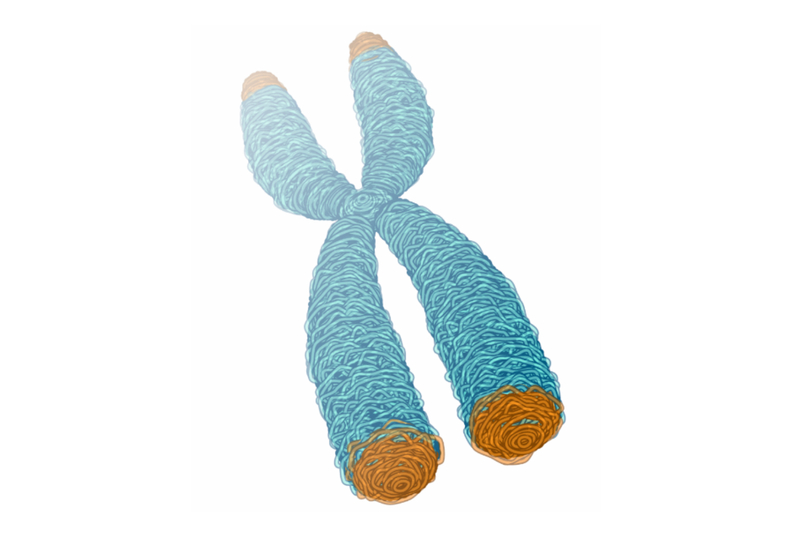News
The Telomere Age Theory

Among the various scientific theories explaining the aging process, the Telomere Age Theory stands out for its compelling connection between cellular mechanisms and the aging process. Below we discuss telomeres, their impact on cellular aging, and practical strategies to prevent telomere shortening.
What Are Telomeres?
Telomeres are repetitive DNA sequences at the ends of chromosomes, serving as protective caps that prevent chromosomes from deteriorating or fusing with neighboring chromosomes. Imagine them as the plastic tips on shoelaces, preventing fraying. Each time a cell divides, a small portion of the telomere is lost, gradually shortening with each division.The Telomere Age Theory
The Telomere Age Theory posits that telomere length is a biological marker of aging. As cells divide over time, telomeres become progressively shorter, eventually leading to cellular senescence or apoptosis (programmed cell death). Senescent cells lose their ability to divide and function properly, contributing to the aging process and the onset of age-related diseases. These cells can accumulate and secrete inflammatory factors, contributing to chronic inflammation and tissue degradation, which are hallmarks of aging. The presence of senescent cells is associated with conditions such as cancer, cardiovascular disease, and neurodegenerative disorders.Preventing Telomere Shortening
While telomere shortening is a natural part of aging, research suggests several strategies that may help slow down this process. You won’t be surprised that a healthy diet, exercise, and sleep are among the top contributors to slowing down the process.- Adopt a Healthy Diet
- Antioxidant-Rich Foods: Consuming foods high in antioxidants, such as berries, nuts, and leafy greens, can protect telomeres from oxidative stress.
- Mediterranean Diet: Emphasizing fruits, vegetables, whole grains, and healthy fats, this diet is linked to longer telomeres.
- Engage in Regular Physical Activity
- Exercise: Regular aerobic and resistance exercise is associated with longer telomeres. Activities such as walking, running, and strength training can be beneficial.
- Prioritize Sleep
- Aim for 7-9 hours of sleep per night. Adequate and restful sleep is crucial for maintaining telomere length and overall health.
- Manage Stress
- Stress Reduction Techniques: Practices like meditation, yoga, and mindfulness can lower stress levels. Chronic stress is a known factor in accelerating telomere shortening.
- Consider Nutrition Supplements
- Omega-3 Fatty Acids: Found in fish oil and flaxseeds, these fatty acids have been shown to positively impact telomere length.
- Vitamins and Minerals: Ensure sufficient intake of vitamins C, D, E, zinc, and magnesium.
- Avoid Harmful Exposures
- Quit Smoking: Smoking is a significant risk factor for accelerated telomere shortening.
- Limit Toxin Exposure: Reduce exposure to environmental pollutants and harmful chemicals.
The Future of Telomere Research
The Telomere Age Theory provides a fascinating lens through which to view the aging process. By understanding the role of telomeres in cellular aging and adopting lifestyle habits that support telomere health, we may enhance longevity and improve our quality of life. As research advances, we will gain deeper insights into the validity and applications of this theory.It's important to remember that while these strategies are promising, consulting healthcare professionals before making significant lifestyle changes or starting new treatments is crucial. Regardless of the impact of telomere shortening on aging, embracing a holistic approach to health—focusing on balanced nutrition, regular exercise, sleep, stress management, and overall well-being—is always beneficial.
References:
- Blackburn, E. H., & Epel, E. S. (2017). *The Telomere Effect: A Revolutionary Approach to Living Younger, Healthier, Longer*. Grand Central Publishing.
- Shammas, M. A. (2011). Telomeres, lifestyle, cancer, and aging. *Current Opinion in Clinical Nutrition & Metabolic Care*, 14(1), 28-34.
- Ornish, D., et al. (2013). Effect of comprehensive lifestyle changes on telomerase activity and telomere length in men with biopsy-proven low-risk prostate cancer: 5-year follow-up of a descriptive pilot study. *The Lancet Oncology*, 14(11), 1112-1120.
More News
-
New!
More

The Heart of It All: How Cardiovascular Health Shapes Longevity
Most of us know a healthy heart will increase our chances for a long and vital life, but how many of us truly understand how to live for a healthy heart? According to the American Heart Association, heart disease remains the number one cause of death, for both men and women, in the United States.
-
New!
More

GLP-1s and Your Health Journey: What You Need to Know
Interest in GLP-1 agonist medications, once used almost exclusively for diabetes, is soaring. Now widely referred to as weight loss injections, drugs like semaglutide (Ozempic, Wegovy) and tirzepatide (Mounjaro, Zepbound) are ubiquitous in celebrity chatter, social media and everyday patient conversations. But as demand grows, it’s increasingly important to separate hype from reality. Who qualifies for these drugs under FDA guidelines? When are they helpful? And when might carefully supported lifestyle changes offer a safer or more sustainable path?
-
New!
More

Back on the Slopes: How to Recover Physically and Mentally After a Ski or Snowboard Injury
Living in a ski town, injury is inevitable. Recovery isn’t just about regaining strength, it’s about building trust in your body. The best path back to skiing blends physical training with mental conditioning, patience with persistence. With the expert teams at Vail Health - from Howard Head Sports Medicine to Vail Health Behavioral Health - recovery is more than healing; it’s coming back stronger, smarter and more confident than before.





